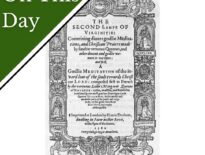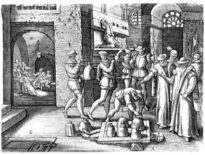Thank you to Şebnem for asking "Did Elizabeth of York really have an affair with Richard III?", something which has been popularised by the "Cousins' War" series of novels by Philippa Gregory and the TV adaptations of them.
Is there any truth to this idea? Was Elizabeth of York in love with Richard III? Did Richard and his niece become lovers? And did Richard III poison Anne Neville, his queen?
I look at what history tells us about Elizabeth of York and her uncle, Richard III.
Book recommendation: Elizabeth of York: The Forgotten Tudor Queen by Amy Licence
Article for further reading: https://nerdalicious.com.au/history/elizabeth-of-york-and-her-kings-richard-iii/



No, Elizabeth of York didn’t have an affair with Richard iii. Elizabeth might have found him attractive, after all he wasnt bad looking and was charming. She was also an eighteen year old who had recently spent over a year in Sanctuary, with her scheming mother and several sisters and a half brother, a couple of servants, etc. This was her first outing to Court in over 18 months. It was Christmas 1484, a raucous one by all accounts, especially Crowland and there was loud music, dancing, plenty of rich food and drink and according to his gossip, a lot of sexual tension.
Anne about five years older than Elizabeth and her sister Cecily, also at Court and it was a mark of favour to dress up in similar or matching outfits and Elizabeth dressed in an outfit the same as Anne’s. There was nothing unusual in this and the girls had a good time. Where’s the love affair? Added later as with so many documents rewritten under the Tudors. There is no contemporary evidence but there were contemporary rumours.
In March 1485 Anne Neville died aged around 24. She died of TB and had been ill for a number of months. Her health was failing even before Christmas and Richard knew that she was dying because she was so infectious that he was told to keep away from her and that their should be no physical contact. He was later criticised for this but he did actually visit Anne, but did not sleep with her. If anyone has ever lived with someone infectious and sick they will understand. Its perfectly natural and reasonable to avoid physical and intimate contact while still caring for them and their needs. Its also agony as all you want to do is hold them and yet you cant. We all know what that is like through Covid. That doesn’t mean Richard was cold towards his wife, it doesn’t show he didn’t care, it didn’t show him as callous. It showed him taking doctors advice and it shows he cared enough to still visit her.
What Elizabeth felt about Richard is virtually unknown except for two pieces of evidence one contemporary, one not. Elizabeth had a book dedicated to Richard, which he had given her. His inscription and signature is inside and underneath, Elizabeth has written her own name and dedication. She was apparently fond of this gift. That proves Elizabeth held Richard in high esteem. It sounds as if Elizabeth treasured a precious item which belonged to an esteemed Uncle.
The second and often misunderstood item is part of a letter in which Elizabeth wrote of her affection for Richard and somewhat excitedly about a marriage she is hopeful off. She hopes he will keep her fondly in mind. Now here is the problem. The letter was written to John Howard, 1st Duke of Norfolk, no longer exists in an original extant form and was cited by George Buck in the 17th century. O.K. So what have we got? The letter obviously refers to a future marriage which has been proposed and Elizabeth is excited about the prospect. This has led some people to speculate that this is a proposal from Richard himself. The letter is estimated to have been written in June 1485. This would actually make sense, even without the fact that we cannot be certain of anything regarding this letter. After his wife died, within a few weeks Richard sent out Ambassadors to Spain and Portugal regarding a marriage for himself and one for Elizabeth. Elizabeth was promised to the brother of the King of Portugal, the future Manuel ii. We know this from the Archives in Portugal. We also know of it from contemporary Chronicles in England.
The rumours about Richard and Elizabeth were certainly concerning enough that William Catesby and others persuaded Richard to deny them. He did not have to do it but he himself was shocked. Elizabeth was his niece. A relationship with her would be incest. He issued a Proclamation and kept his distance and invested in marriages for his nieces as well. It’s highly unlikely that any affair took place or that Richard was in love with his niece. Nor is there any evidence that Anne was poisoned. Any rumours were put about by his enemies, made use of by Shakespeare and exaggerated by Philippa Gregory who wrote a load of rubbish about everyone and nobody should take any of her works seriously.
Thank you thank you thank you! I am just now discovering this site, and so pleased to read of your explanation above. I agree that historical fiction writers have not been helpful in the least at portraying these historical figures, especially when it is then made for tv. My one question to your post above is – If Richard had made Edward IV’s children (including Elizabeth, his eldest child) illegitimate, why would Portugal be interested in her for marriage? Henry VII had to reverse it to restore her name before even he could marry her.
I have wondered this myself. Why would Portugal even be interested in marrying her if she had been declared illegitimate? There is more to the story for sure. I hope we will one day uncover the truth about this fascinating time in history!
I wouldn’t call Elizabeth Woodville scheming, she simply was constantly at risk of being killed along with all of her children, her husband was constantly at risk of being killed and deposed, and then when he finally did die she was even more alone and at risk. You had to “scheme” to survive in her position and at that time. Her relationship to the king was an extremely dangerous one in an unprecedented and unstable time.
Ummm…the letter you refer to from Elizabeth to the Duke of Norfolk was apparently written in FEBRUARY 1485 since she refers to “the better part of February” being gone.
We don’t have the original text only the summary made by the historian George Buck, but I’m afraid it doesn’t support your interpretation very well Here is his text:
[QUOTE]
“When in the midst and more days of February [1485] were gone, the Lady Elizabeth, being very desirous to be married and, growing not only impatient of delays, but also suspicious of the [success], wrote a letter to Sir John Howard, Duke of Norfolk, intimating first therein [he was the] one in whom she most [trusted], because she knew the King her father much loved him, and that he was a very faithful servant unto him and to [Richard], and very loving and serviceable to King Edward’s children.
First, she thanked him for his many courtesies and friendly [offices, and] then she prayed him, as before, to be a mediator for her in the case of [the marriage] to the King, who, as she wrote, was her only joy and maker in [this] world, and that she was his in heart and thoughts, in [body] and in all.
And then she intimated that the better half of Fe[bruary] was passed, and that she feared the Queen would nev[er die].”
[END QUOTE]
The last sentence makes it hard to conclude she’s talking about anything but her marriage to Richard, but if course it’s all unclear because we don’t have the original letter. But I think you’ll agree your interpretation is a bit of a reach.
Regarding the supposed arranged marriage for Elizabeth with the Portuguese royal family, I believe the actual documents only stipulate the subject to be a niece of the king and don’t specify which one. It may have been one if Elizabeth’s sisters and Elizabeth herself.
I love this site as well, and appreciate the answers of historical accuracy…but in defense of Phillipa Gregory, an author i absolutely love, she is very clear about the fact that her books are works of FICTION, based on real people and events but expanded upon to make wonderful historical fiction! She also clearly explains this at the end of each book. I first learned about the Tudors thru her books, and have since continued to study the Tudor period for what it actually was. Thank you for the continuing education; your column is awesome!
Thank you, Ms. Sözer, for the question, because I saw part of “The White Princess” series on a popular streaming site, and Elizabeth’s portrayal as a calculating woman who had an affair with her uncle (Richard III) disturbed me enough that I couldn’t watch it further. There were other reasons, such as portraying Margaret Beaufort as a cold, calculating woman who likely had a role in the deaths of Richard’s nephews. I just couldn’t evoke the “suspended disbelief” required to enjoy fantasy series such as “Outlander” (which I liked a lot) and historically-based, but inaccurate, movies such as “Braveheart” (ditto).
The thought of an uncle and niece having an affair and hoping to marry would probably be as repulsive and reprehensible to people back then as it is now. They were likely as affectionate towards each other as an uncle and niece normally are.
I wonder why Ms. Gregory puts this repugnant stuff in her books? I recall Claire discussing Ms. Gregory’s book “The Other Boleyn Girl” (which is another movie featured on this same streaming site). It is very unlikely that Anne had sex with her brother, as Henry’s kangaroo court claimed.
Which Ms Gregory clearly asserts, when discussing her book later, and the book also leaves the issue ambiguously unclear…it makes Cromwell the author of the preposterous charges, and while a few situations made her wonder, Mary does not assert the incest to be true. Fiction is often like soap operas…drama makes it more interesting! If it bothers you, perhaps stick to biographies next time.
https://royalcentral.co.uk/features/royal-history-mystery-did-richard-iii-want-to-marry-his-niece-143203/?cn-reloaded=1
“Avunculate marriages, between a niece and an uncle, weren’t unheard of in European royal houses at the time and while there was debate about the close level of relationship involved, papal dispensations were given for such unions to take place. The marriage would have been possible but whether either party desired it is debatable.”
https://royalcentral.co.uk/features/royal-history-mystery-did-richard-iii-want-to-marry-his-niece-143203/
“Avunculate marriages, between a niece and an uncle, weren’t unheard of in European royal houses at the time and while there was debate about the close level of relationship involved, papal dispensations were given for such unions to take place. The marriage would have been possible but whether either party desired it is debatable. “
thank you R. can you list any books on the woodvilles/Tudor eras that you enjoyed the most?